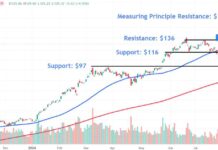Wall Street is abuzz with excitement as positive news continues to fuel the financial markets. The capital markets, known for their volatility, have been on a rollercoaster ride in recent years. When interest rates soared in 2022, the immediate reaction was a sharp decline in stocks and a stall in corporate expansion plans. However, the economy has proven to be more resilient, adapting slowly to the changes. Despite inflation creeping up, consumers did not drastically cut back on spending. Instead, they turned to credit cards to maintain their lifestyle. With a robust labor market, borrowers were able to manage their debt even as interest rates increased.
Consumer banks have emerged as the winners in this shifting landscape. While other sectors may be feeling the pinch, consumer banks are thriving. Resilient borrowers have kept defaults and delinquencies at bay, leading to increased interest income for these financial institutions. The contrast between the struggles of capital markets and the success of consumer banks highlights the diverse impacts of economic changes.
Wall Street Rejoices
The recent surge in stock prices has brought a sense of relief to Wall Street. Despite looming threats and uncertainties, investors have been riding a wave of optimism. Small American firms, in particular, have captured the hearts of investors, showcasing strong growth potential and innovative business strategies. This newfound enthusiasm has given Wall Street a much-needed reason to celebrate after a period of volatility and uncertainty.
Global Economic Trends
While Wall Street thrives, global economic trends paint a mixed picture. Japan’s economic strength has led to a weakened yen, impacting international trade and currency markets. In contrast, China’s economic growth figures have disappointed, raising concerns about the stability of the world’s second-largest economy. These contrasting trends underscore the interconnected nature of the global economy and the ripple effects of economic decisions made by major players in the market.
Building Homes and Containing Rents
In the midst of economic fluctuations, certain cities in the United States have adopted a proactive approach to housing development. YIMBY (Yes In My Backyard) cities have shown how to effectively build homes and contain rents, addressing the ongoing housing crisis in the country. By promoting sustainable urban development and affordable housing initiatives, these cities serve as a model for addressing housing challenges and fostering community growth.
As Americans navigate through a period of economic uncertainty and market volatility, the need for stability and bipartisan cooperation remains a contentious issue. Despite the allure of a bygone era of stable bipartisanship, the reality of today’s political landscape poses challenges to achieving consensus and collaboration on key economic issues. The divergent viewpoints and priorities of policymakers and stakeholders highlight the complexities of governance in a rapidly changing economic environment.
In conclusion, Wall Street’s celebration of positive news reflects the resilience and adaptability of the financial markets in the face of economic challenges. While consumer banks enjoy a period of prosperity, global economic trends continue to fluctuate, presenting both opportunities and risks for investors and businesses. As the world navigates through uncertain times, the lessons learned from past experiences and the innovative strategies adopted by key players will shape the future of the financial landscape.

















